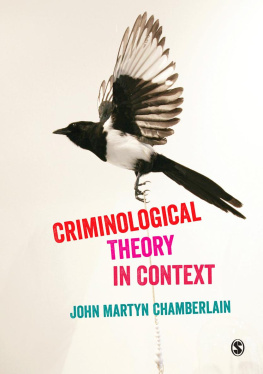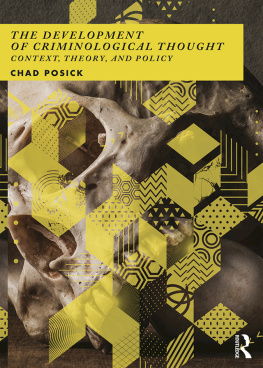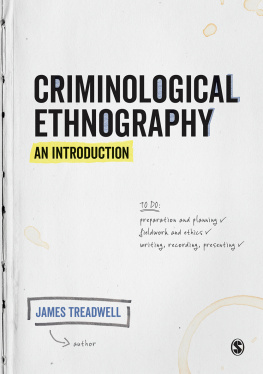C. WRIGHT MILLS AND THE CRIMINOLOGICAL IMAGINATION
Classical and Contemporary Social Theory
Series Editor: Stjepan G. Mestrovic, Texas A&M University, USA
Classical and Contemporary Social Theory publishes rigorous scholarly work that re-discovers the relevance of social theory for contemporary times, demonstrating the enduring importance of theory for modern social issues. The series covers social theory in a broad sense, inviting contributions on both classical and modern theory, thus encompassing sociology, without being confined to a single discipline. As such, work from across the social sciences is welcome, provided that volumes address the social context of particular issues, subjects, or figures and offer new understandings of social reality and the contribution of a theorist or school to our understanding of it. The series considers significant new appraisals of established thinkers or schools, comparative works or contributions that discuss a particular social issue or phenomenon in relation to the work of specific theorists or theoretical approaches. Contributions are welcome that assess broad strands of thought within certain schools or across the work of a number of thinkers, but always with an eye toward contributing to contemporary understandings of social issues and contexts.
Also in the series
Max Webers Theory of Modernity
The Endless Pursuit of Meaning
Michael Symonds
ISBN 978-1-4724-6286-2
David Riesmans Unpublished Writings and Continuing Legacy
Edited by Keith Kerr, B. Garrick Harden and Marcus Aldredge
ISBN 978-1-4724-2848-6
Sociological Amnesia
Cross-currents in Disciplinary History
Edited by Alex Law and Eric Royal Lybeck
ISBN 978-1-4724-4234-5
A Sociology of the Total Organization
Atomistic Unity in the French Foreign Legion
Mikaela Sundberg
ISBN 978-1-4724-5560-4
C. Wright Mills and the Criminological Imagination
Prospects for Creative Inquiry
Edited by
JON FRAULEY
University of Ottawa, Canada
First published 2015 by Ashgate Publishing
Published 2016 by Routledge
2 Park Square, Milton Park, Abingdon, Oxon OX14 4RN
711 Third Avenue, New York, NY 10017, USA
Routledge is an imprint of the Taylor & Francis Group, an informa business
Copyright Jon Frauley and the Contributors 2015
Jon Frauley has asserted his right under the Copyright, Designs and Patents Act, 1988, to be identified as the editor of this work.
All rights reserved. No part of this book may be reprinted or reproduced or utilised in any form or by any electronic, mechanical, or other means, now known or hereafter invented, including photocopying and recording, or in any information storage or retrieval system, without permission in writing from the publishers.
Notice:
Product or corporate names may be trademarks or registered trademarks, and are used only for identification and explanation without intent to infringe.
British Library Cataloguing in Publication Data
A catalogue record for this book is available from the British Library
The Library of Congress has cataloged the printed edition as follows:
C. Wright Mills and the criminological imagination : prospects for creative inquiry / [edited] by Jon Frauley.
pages cm. (Classical and contemporary social theory)
Includes bibliographical references and index.
ISBN 978-1-4724-1474-8 (hardback : alk. paper) ISBN 978-1-3155-7070-9 (ebook) ISBN 978-1-3171-7022-8 (epub) 1. Mills, C. Wright (Charles Wright), 19161962. 2. Criminology. I. Frauley, Jon, 1972 editor.
HV6025.W75 2015
364dc23
2015014522
ISBN 9781472414748 (hbk)
ISBN 9781315570709 (ebk-PDF)
ISBN 9781317170228 (ebk-ePUB)
summa experimenti sumus
For Isobel and Amelia, with love
Contents
by Elliott Currie
Jon Frauley
Jon Frauley
Frank P. Williams III
Eamonn Carrabine
Stephen Pfohl
Joseph A. Scimecca
Melanie White
Nicolas Carrier
David Scott
Alana Barton and Howard Davis
Rob White
Stephanie Piamonte
David Nelken
Notes on Contributors
Alana Barton is Senior Lecturer in Criminology at Edge Hill University (United Kingdom).
Eamonn Carrabine is Professor and former Head of Sociology at the University of Essex (United Kingdom).
Nicolas Carrier is Associate Professor of Criminology at Carleton University (Canada).
Howard Davis is Senior Lecturer in Criminology at Edge Hill University (United Kingdom).
Jon Frauley is Associate Professor of Criminology at the University of Ottawa (Canada) and for 20142015 was Visiting Professor of Law and Legal Studies, Criminology and Criminal Justice at Carleton University (Canada).
David Nelken is Professor of Comparative and Transnational Law and Associate Dean and Head of Research at the Dickson Poon School of Law, Kings College London (UK). Since 2010 he has been Visiting Professor of Criminology at Oxford University (UK). In 2014 he was Global Law Professor at Tilburg Law School, the Netherlands. Previous appointments include Distinguished Professor of Legal Institutions and Social Change at the University of Macerata (Italy) and Distinguished Research Professor of Law at Cardiff University (Wales).
Stephen Pfohl is Professor of Sociology at Boston College (United States).
Stephanie Piamonte is a PhD Candidate in Criminology at the University of Ottawa (Canada).
Joseph A. Scimecca is Professor of Sociology at George Mason University (United States).
David Scott is Senior Lecturer in Criminology at Liverpool John Moores University (United Kingdom).
Melanie White is Senior Lecturer in Social Theory in the School of Social Sciences at the University of New South Wales, Australia.
Rob White is Professor of Criminology in the School of Social Sciences at the University of Tasmania (Australia).
Frank P. Williams III is Professor Emeritus of Criminal Justice at California State University, San Bernardino (United States).
Foreword
This book comes at a pivotal moment for the field of criminology. That may seem like something of a clich, but I believe its true. As some of the contributors to this volume point out, criticism of a dearth of imagination in academic criminology isnt new: in fact, some of these authors themselves first made that critique decades ago. What is new, to me, is the vibrancy of some trends within criminology that could revitalize the field and restore that lost imagination.
There are (at least) two criminologies today. One is the rather soulless variant of the scientism that C. Wright Mills lambasted at the end of the 1950s whose ascendancy is the target of many of this books authors. But that isnt the whole story. Indeed, it probably never was. Creative, boundary-pushing work has always coexisted with more timid and narrow variants, for at least as long as Ive been at this work, which is, by now, longer than I want to think about. But I think that kind of creative work is more common today than it was twenty years ago, or even back in the day when I began.






